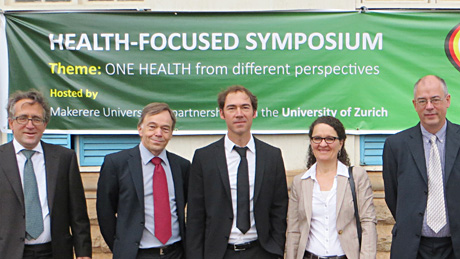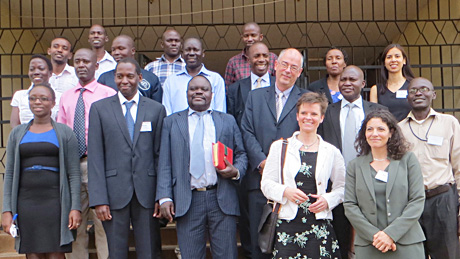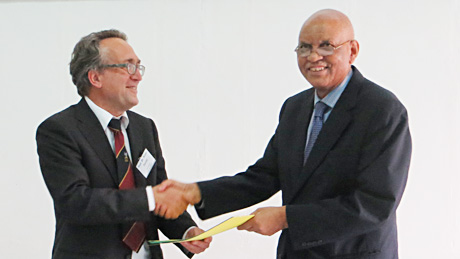Navigation auf uzh.ch
Navigation auf uzh.ch

HIV is one of the most common infectious diseases in Africa, and in Uganda, an estimated seven percent the population is infected with the virus. Because the disease weakens the immune system, some victims also contract secondary diseases such as tuberculosis. It is precisely these patients with HIV and tuberculosis that SOUTH, Study on Outcome-related Tuberculosis-HIV drug-concentration, hopes to help.
To this end, UZH and UniversityHospital Zurich are working together with the Infectious Disease Institute (IDI) of Makerere University in the Ugandan capital, Kampala. IDI is one of the leading African research institutes for infectious diseases, but also a center for the treatment of HIV patients.

140 patients who are coinfected with HIV and tuberculosis are currently taking part in SOUTH. They receive medicine to treat both diseases and undergo regular blood tests as part of the study.
The study examines existing correlations between the outcome of the therapy and the concentration of TB drugs in the blood. A reliable threshold value of the concentration would make it possible to treat patients more efficiently and with fewer side effects.
Jan Fehr, who is a consultant at the Division of Infectious Diseases and Hospital Epidemiology at UniversityHospital Zurich and heads the study, reported on the initial findings of the study at the symposium at Makerere University (see box below). The findings show that the threshold values used thus far are not reliable and – as suspected by some experts – need to be redefined.
«A study like this would not be possible in Switzerland on account of the low number of persons infected there. The findings will be of global interest», Fehr believes.
The project commenced in April 2013 and is part of the University of Zurich’s North-South Cooperation. Since 2008, this initiative has been promoting an exchange of knowledge and mutual intercultural learning with academic institutions in Africa. The cooperation supports sustainable projects in research and teaching as well as in capacity development.
The SOUTH Project also involves biostatisticians from the Division of Infectious Diseases and Hospital Epidemiology as well as the Division of Clinical Pharmacology and Toxicology and the Institute of Clinical Chemistryat UniversityHospital Zurich.
The study aims to be more than a mere research project. Another objective is to enhance diagnosis and treatment capacity at IDI. The cooperation therefore also includes training modules for doctors and nursing staff and the creation of a PhD program. A doctor from Uganda is currently the first to be completing her doctorate as part of SOUTH. A laboratory technician from IDI received training at University HospitalZurich to operate an existing analysis device in Kampala. He is now able to measure tuberculosis drugs and other medicines in the bloodstream.

But the flow of knowledge transfer is not only in the direction of the South to North. Lars Henning, a doctor from Jan Fehr’s team, has established and accompanied the study in Kampala over the past year and a half. Now another doctor from UniversityHospital Zurich, Amrei von Braun, has traveled to Kampala to start another cooperation project there.
The new project will carry out research to determine whether the monitoring system for HIV patients advocated by WHO makes sense. According to the current system, a patient’s health can be assessed using what is referred to as the patients’ ‘immune status,’ which is measured on the basis of the T-helper cells. Amrei von Braun will examine how many patients do not get the best possible treatment based on those guidelines. In the event of treatment failure, viruses are also to be tested for resistance.
According to Jan Fehr, the findings could represent significant new information in particular for poorer countries that work in accordance with WHO guidelines. At the same time, new findings on resistance are also of interest to richer countries like Switzerland.
